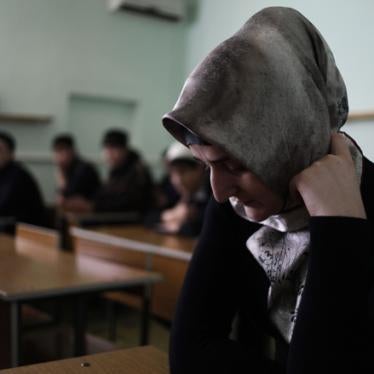The sexual humiliation of prisoners at Abu Ghraib prison is so shocking that it risks overshadowing other U.S. interrogation practices that are also reprehensible. And unlike the sexual abuse, these other practices have been sanctioned by the highest levels of government and are probably more widespread.
The Abu Ghraib outrages are not simply the product of a small group of sick and misguided soldiers. They are the predictable result of the Bush administration's policy of permitting "stress and duress" interrogation techniques. The sexual abuse of prisoners, despicable as it is, is a logical consequence of a system put in place after Sept. 11, 2001, to ratchet up the pain, discomfort and humiliation of prisoners under interrogation.
The Defense Department has adopted a 72-point "matrix" of types of stress to which detainees can be subjected. These include stripping detainees naked, depriving them of sleep, subjecting them to bright lights or blaring noise, hooding them, exposing them to heat and cold, and binding them in uncomfortable positions. The more stressful techniques must be approved by senior commanders, but all are permitted. And nearly all are being used, according to testimony taken by Human Rights Watch from post-Sept. 11 detainees released from U.S. custody.
None of these techniques is legal. Treaties ratified by the United States, including the Geneva Conventions and the U.N. Convention Against Torture, prohibit not only torture but also "cruel, inhuman or degrading treatment or punishment." In ratifying the Convention Against Torture, the U.S. government interpreted this provision to prohibit the same practices as those proscribed by the U.S. Constitution. The Bush administration reiterated that understanding last June.
In other words, just as U.S. courts repeatedly have found it unconstitutional for interrogators in American police stations to use these third-degree methods, it is illegal under international law for U.S. interrogators in Iraq, Afghanistan, Guantanamo Bay or elsewhere to employ them. U.S. military manuals ban these "stress and duress" techniques, and federal law condemns them as war crimes. Yet the Bush administration has authorized them.
But doesn't the extraordinary threat of terrorism demand this extraordinary response? No. The prohibition of torture and cruel, inhuman, or degrading treatment or punishment is absolute and unconditional, in peace or in war. This dehumanizing practice is always wrong.
Moreover, resorting to abusive interrogation is counterproductive. People under torture will say anything, true or not. And whatever marginal advantage interrogators might gain by applying these techniques is vastly outweighed by the global disgust at American use of them.
Coupled with anger at other lawless practices, such as the Bush administration's refusal to apply the Geneva Conventions to the Guantanamo detainees, that revulsion has contributed to America's plummeting esteem. Allies are less willing to cooperate in combating terrorism, and terrorist recruiters must be having a field day.
But can't torture at least be used on someone who might know of an imminent terrorist act? Not without opening the door to pervasive torture. The problem with this "ticking bomb" scenario is that it is infinitely elastic. Why stop with the terrorist suspect himself? Why not torture his neighbor or friend who might know something about an attack? And why stop with an imminent attack? Aren't the potential victims of possible future attacks just as worthy of protection by torture? The slope is very slippery.
It has been argued that because some interrogators will inevitably resort to coercion, torture should be regulated. But by signaling that torture and mistreatment are sometimes justified, regulation ends up encouraging more Abu Ghraibs.
Government officials are also notoriously poor at regulating coercive interrogation techniques. For example, Israel's effort to regulate the application of "moderate physical pressure" led to deaths in custody and ultimately a decision by Israel's Supreme Court to outlaw it. Human Rights Watch and others have repeatedly reported abusive techniques on the part of U.S. interrogators, but the Bush administration did nothing to address them until the photographs of Abu Ghraib became public. Indeed, to this day, no one has been prosecuted for two deaths of detainees in U.S. custody in Afghanistan; medical examiners declared those deaths "homicides" a year and a half ago.
Maj. Gen. Geoffrey D. Miller announced last week that certain stress interrogation techniques will no longer be used in Iraq. That's a useful first step. President Bush should now ban all forms of "stress and duress" interrogation, in Iraq and elsewhere. Various noncoercive methods, from inducements to trickery, can still be used, as able interrogators have done for decades.
And no one contends that detention centers should be country clubs. But the deliberate ratcheting up of pain, suffering and humiliation as an interrogation technique must be stopped. It is wrong itself, and it leads to further atrocities.
The writer is executive director of Human Rights Watch.






